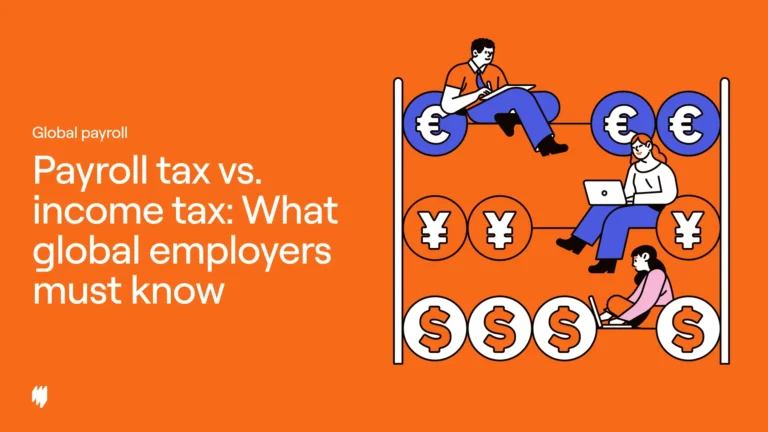As businesses go global, understanding international employment laws isn’t just a legal necessity—it’s a strategic imperative. Multinational corporations need to understand and comply with employment laws in different countries to shield themselves from penalties and cultural losses of face.
But that’s not all. Understanding international employment law helps businesses ensure legal compliance, mitigate risks, foster positive employee relations, and attract top global talent, enhancing competitiveness and sustainability.
However, the process can be challenging.
- Diverse regulations: Each country or jurisdiction has its own set of rules regarding employment contracts, working hours, leave entitlements, minimum wage, termination, and other aspects of the employer-employee relationship. Navigating these regulations requires careful attention to detail and a thorough understanding of each country’s legal requirements.
- Complexity: Domestic employment laws are usually governed by a single set of regulations within a country. But international employment law involves navigating diverse legal frameworks of multiple jurisdictions, which can vary significantly in their scope, interpretation, and application. This makes it challenging for multinational corporations to understand and comply with the laws of each country where they operate.
- Operational burden: Managing compliance across multiple countries can be operationally burdensome. Companies need to ensure that their HR policies and practices align with the legal requirements of each jurisdiction while maintaining efficiency and consistency across the organization. This may involve implementing complex systems and processes to track and monitor compliance, as well as dedicating resources to address any issues that arise. There is a high possibility that this will burn time and resources if not planned efficiently.
Clearly, having a working idea of international employment laws is imperative. So let’s look at some basic factors covered by these regulations.
Basics of international employment law
International employment law encompasses fundamental aspects crucial for businesses operating across borders. Key areas include:
- Employment contracts: Contracts outline terms and conditions of employment, but vary in content and structure globally. For example, while employment contracts in the US often prioritise flexibility and may include at-will provisions allowing termination without cause, contracts in France typically include more extensive protections for employees, such as stringent notice periods and severance pay requirements.
- Working hours: Regulations on working hours, breaks, and overtime pay differ between jurisdictions, impacting employee rights and business operations. In Germany, working hours are governed by the Working Time Act, which limits the maximum working hours per week to 48 and mandates breaks after certain hours of work. In contrast, countries like Japan may have more flexible regulations on working hours, but cultural norms may still influence expectations around overtime and work-life balance.
- Leave entitlements: Vacation, sick leave, and parental leave entitlements also vary from country to country. In Sweden, employees are entitled to generous parental leave benefits, with both parents typically receiving several months of paid leave to care for newborn children. In contrast, parental leave entitlements in the US vary by state and employer, with some offering limited or no paid leave benefits.
- Minimum wage regulations: Minimum wage laws differ greatly, affecting labor costs and competitiveness. For example, the minimum wage in Australia is set by the national government and is adjusted annually based on inflation and other economic factors. In contrast, the minimum wage in India varies by state and industry, with some states implementing their own minimum wage laws.
Keeping track of these different laws and regulations can be daunting for global companies. Unfortunately the don’t have a way around it. Businesses must navigate these diverse legal frameworks to ensure compliance and avoid liabilities. It’s also important to protect the business from expensive operational disruptions and reputational damage.
So understanding and adapting to these variations is essential for effective global HR management. But what are the most important factors that you need to take into account as you enter new markets and employ internationally?
Hiring internationally
Here are some key legal considerations for hiring internationally:
- Visa requirements: Each country has its own visa categories and eligibility criteria for foreign workers. Businesses must obtain the necessary work visas or permits for their international hires to work legally in the host country.
- Background checks: It’s common practice to verify qualifications, employment history, and criminal records of potential employees. However, the legality of background checks varies across jurisdictions. Some countries impose strict regulations on the collection and use of personal data. Multinational corporations must comply with local data protection laws when conducting background checks on international hires.
- Anti-discrimination laws: These prohibit employers from discriminating against job applicants based on protected characteristics such as race, gender, age, religion, and disability. These laws vary in scope and enforcement across countries, with some jurisdictions imposing stringent penalties for violations. Multinational corporations must ensure that their hiring practices comply with local anti-discrimination laws to avoid legal liabilities and reputational damage.
- Employment contracts: These should address key provisions such as job duties, compensation, benefits, termination, and dispute resolution mechanisms. Businesses should seek legal advice to ensure that their employment contracts are enforceable and compliant with local laws.
- Immigration compliance: Businesses must also verify and comply with reporting and documentation requirements imposed by immigration authorities. Failure to comply with immigration laws can result in severe penalties, including fines, deportation, and restrictions on future hiring.
Businesses have to conduct thorough research, seek legal advice, and implement robust HR practices to ensure compliance with local laws and mitigate risks associated with hiring international employees. To simplify this, Multiplier offers a smart HR software that helps streamline international hiring.
Multiplier’s EOR solution empowers you to handle hiring, onboarding, payroll and benefits for your international employees without maintaining a business entity in their country. Experts stationed across 150+ countries, give you the legal expertise to sit back and rest, knowing that your employment contracts and other international business decisions comply with the latest laws and regulations. Additionally, Multiplier also takes care of complicated visa processing, seamlessly acquiring employment visas for your employees.
Managing international employees
Managing international employees presents unique legal challenges for multinational corporations, SMEs, and their HR departments. From performance management to data protection and privacy laws, businesses face a complex regulatory landscape to navigate.
Performance management
Performance management practices, including performance evaluations, goal-setting, and disciplinary actions, must comply with local employment laws and cultural norms in each jurisdiction where the business operates. While some countries have strict regulations governing performance appraisals and employee feedback, others may have more flexible frameworks.
Multinational corporations should establish clear performance management policies and procedures that align with local regulations and international best practices to promote fairness and transparency.
Data protection and privacy laws
Data protection and privacy laws regulate the collection, processing, and storage of personal data, including employee information. With the increasing digitization of HR processes and the use of technology in the workplace, businesses must comply with stringent data protection regulations to safeguard employee privacy rights. The General Data Protection Regulation (GDPR) in the European Union and the California Consumer Privacy Act (CCPA) in the US are examples of comprehensive data protection laws that impose strict requirements on businesses handling personal data.
Global businesses must implement robust data protection measures, such as data encryption, access controls, and privacy impact assessments, to ensure compliance with local and international data protection laws.
Cultural sensitivity and diversity
Managing international employees also requires cultural sensitivity and awareness of diversity issues. Cultural differences in communication styles, work habits, and management practices can impact employee engagement and performance.
Foster a culture of inclusion and diversity and provide training and support to managers and employees to promote cross-cultural understanding and collaboration. By embracing cultural diversity, you can harness the unique strengths and perspectives of your international workforce and drive innovation and success.
By prioritizing compliance with local regulations, promoting diversity and inclusion, and adopting best practices in HR management, multinational corporations can effectively manage their international workforce and create a conducive work environment for employees worldwide.
The United States is lacking 340K accountants
Discover how 2K US companies are hiring accountants
Termination and severance
Termination laws, notice periods, and severance pay requirements also vary significantly across countries.
Termination laws and notice periods
Termination laws dictate the circumstances under which an employer can terminate an employment relationship and the procedures that must be followed. While some countries have at-will employment arrangements allowing employers to terminate employees without cause and without notice, others have stringent regulations requiring valid reasons for termination and specified notice periods. For example, in the US, most states follow an at-will employment doctrine. But in countries like France and Germany, employers must provide notice periods ranging from several weeks to several months, depending on factors such as length of service and seniority.
Severance pay requirements
Severance pay, also known as redundancy pay or termination compensation, refers to the financial compensation that employers must provide to employees upon termination of employment. The amount of severance pay varies widely across jurisdictions and is often influenced by factors such as length of service, salary level, and local regulations. For instance, some countries, such as Mexico and Brazil, mandate generous severance pay provisions, while others, such as the UK and Singapore, have more limited requirements.
Strategies for compliant employee termination
To ensure compliant employee termination across various countries, businesses can consider the following strategies:
- Legal compliance review: Conduct a comprehensive review of termination laws, notice period requirements, and severance pay regulations in each jurisdiction where your business operates. This ensures that termination practices align with local legal requirements and removes the risk of legal disputes.
- Documented policies and procedures: Establish clear and consistent termination policies and procedures that comply with local laws and international standards. This ensures fairness and transparency in the termination process. Provide employees with written notice of termination and reasons for termination for clear and smooth transitions.
- Training and education: Train and educate HR professionals and managers on compliant termination practices, including legal requirements, cultural sensitivities, and best practices. Training programs should also cover topics such as conducting termination meetings, handling employee grievances, and managing the emotional impact of termination.
- Alternative dispute resolution: Implement alternative dispute resolution mechanisms, such as mediation or arbitration, as a confidential and efficient means of resolving termination-related disputes and to avoid costly litigation. Include dispute resolution clauses in employment contracts and severance agreements to streamline the resolution process and protect the interests of both parties.
Multiplier helps comply with termination and severance requirements across various countries by drafting compliant employments contracts in multiple languages, allocating benefits, managing payroll information, and apportioning the right taxes.
Preventing and resolving employment disputes
Employment disputes can arise unexpectedly and pose significant challenges for companies operating across different legal systems. You’ll need to proactively prevent and manage these disputes to maintain harmonious workplace relationships and avoid costly legal proceedings.
Preventing employment disputes
Prevention is always the best strategy to manage employment disputes. You can take several proactive measures to minimize the risk of disputes, including:
- Clear communication: Establish clear and transparent communication channels with employees to prevent misunderstandings and conflicts. Clearly outline rights, responsibilities, and expectations through employment contracts, policies, and regular communication to foster a positive work environment.
- Comprehensive policies and procedures: Implement robust HR policies and procedures related to issues like discrimination, harassment, and disciplinary actions to comply with local regulations and international standards. Regularly train your managers and employees on these policies to promote awareness and compliance.
- Conflict resolution mechanisms: Provide accessible and effective mechanisms for resolving conflicts internally, such as grievance procedures and mediation services. This encourages employees to address issues early and informally before they escalate into formal disputes.
- Compliance with employment laws: Stay updated on the latest developments in employment laws and regulations in each jurisdiction where the business operates. Consult with legal experts and HR professionals to navigate the complexities of international employment law effectively.
Managing employment disputes
Despite preventive measures, you may still face some employment disputes. In such cases, it’s essential to address them promptly and effectively minimize their impact. Strategies for managing employment disputes include:
- Mediation: Mediation involves a neutral third party facilitating negotiations between the parties involved in the dispute to reach a mutually acceptable resolution. This offers a confidential and non-adversarial alternative to litigation, allowing parties to maintain control over the outcome and preserve working relationships.
- Arbitration: Arbitration is a more formal alternative dispute resolution process where an independent arbitrator or panel of arbitrators hears the arguments and evidence presented by both parties and issues a binding decision. Arbitration can be faster and less expensive than traditional litigation, making it an attractive option for resolving employment disputes across borders.
- Enforcement of agreements: Ensuring that employment contracts and dispute resolution clauses include provisions for mediation or arbitration can streamline the resolution process and minimize the risk of protracted legal battles. You should carefully draft these agreements to ensure enforceability and compliance with local laws.
- Cultural sensitivity: It’s important to recognize and respect cultural differences in communication styles, conflict resolution approaches, and legal systems when managing employment disputes in international contexts. Cultural sensitivity training for HR professionals and managers can help bridge cultural gaps and facilitate constructive dialogue.
Multiplier massively supports international organizations in dispute resolution through clear contract terms, expert legal advice, and rock-solid compliance checks.
Emerging trends in international employment law
As the global business landscape evolves, so do the legal frameworks governing them. Several emerging trends are shaping the future of international employment law:
- Remote work regulations: The rise of remote work has prompted policymakers to revisit traditional employment laws and regulations. Countries are adapting their labor laws to accommodate remote work arrangements, addressing issues such as employee rights, taxation, and jurisdictional challenges. Businesses must stay abreast of evolving remote work regulations to ensure compliance and effectively manage their remote workforce.
- Gig economy challenges: The growing prevalence of gig economy platforms and freelance work presents challenges for international employment law. Gig workers often fall outside the scope of traditional employment laws, leading to debates over their classification as independent contractors or employees. Governments are exploring regulatory frameworks to protect the rights and benefits of gig workers while balancing flexibility and innovation in the gig economy.
Quick fact: Multiplier helps global organizations manage international freelancers and contract workers too. - Digital privacy: With the increasing digitization of HR processes and the use of technology in the workplace, data privacy has increasingly become a critical concern for international employment law. Multinational corporations must implement robust data protection measures and comply with data privacy laws to safeguard employee privacy rights.
- Workplace diversity and inclusion: There is a growing emphasis on workplace diversity and inclusion in international employment law. Governments are enacting legislation to promote diversity and prevent discrimination in the workplace based on race, gender, age, disability, and other protected characteristics. So multinational corporations need to adopt policies and practices that foster a diverse and inclusive work environment, recognizing the benefits of diversity for innovation, productivity, and employee engagement.
- Environmental and social responsibility: There is increasing pressure on businesses to demonstrate environmental and social responsibility in their operations, including their employment practices. Governments are introducing regulations to promote sustainable employment practices, such as fair wages, safe working conditions, and responsible supply chains. So multinational corporations need to incorporate environmental and social considerations into their HR policies and practices to align with regulatory requirements and stakeholder expectations.
Emerging trends in international employment law reflect the evolving nature of work and the global economy. Businesses must stay informed about these trends and adapt their HR strategies and practices to ensure compliance and promote responsible employment practices.
Navigating international employment with Multiplier
Fast-growing multinational businesses understand the need to comply with international employment law for global business success. And with Multiplier’s EOR solution, you can stay ahead of legal trends across jurisdictions, so that your business adapts to the emerging trends in employment practices swiftly.
Multiplier removes the risk and herculean challenges around international employment with its smart payroll and compliance software. It helps you build credibility with a global employee base by delivering consistent, accurate, and compliant HR policies and processes everywhere, every time.
Try Multiplier today.
Sign up for a demo to find out more!







